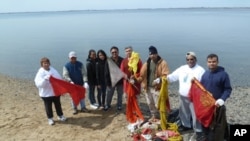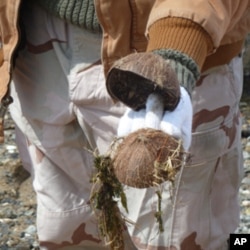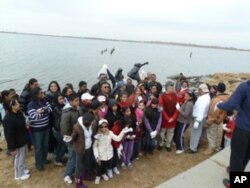The sound of gentle waves and the call of wild shorebirds are normally all you can hear on the shores of Jamaica Bay Wildlife Refuge, an oasis of nature just a few kilometers from the bustling urban heart of Queens, New York. But today, there is work to do.
More than 100 Hindu-Americans of various ages, along with U.S. Park Service rangers and other volunteers comb the shoreline picking up tattered prayer flags, bits of votive candles, statues and other Hindu ritual items that have been accumulating here over the past year.
"We were very, very disgusted and upset and embarrassed because some of the litter is from members of our religious community," says community leader Naidoo Veerapen, who has helped organize these annual cleanups for the past five years. "We thought this was no way to treat one of the beaches of the community in which we live."
River water is an important element in the Hindu religion, which views India’s Ganges River as divine. "And we see the seas and rivers as a representation of Mother Ganga, which nourishes the earth, makes the soil fertile and brings us food. And so our offerings of food, et cetera, are released into the water. In India it’s done that way and we try to copy that ritual here."
Religious leader Phoj Dinidayal says that, because many Hindus believe the Ganges River is holy and pure, they think that whatever is placed in it also becomes pure and will not pollute. But he says he knows now that there is a natural as well as a spiritual reason that Jamaica Bay can be polluted by religious sacrifices.
"The Ganges is flowing one way only. Water does not return. So whatever you throw into the Ganges, it flows into the ocean. Whereas in a bay like this, water comes and goes with ebb tide and high tide and whatever you pour into the water comes back to the shore. So there is a significant difference."
There are other reasons leaving items on the shore or in these waters can harm nature. Fish, shorebirds and other marine animals can become entangled by cloth and other inorganic materials and can be poisoned when ritual items decompose in the water.
Organic offerings such as coconuts and bananas, flowers and candy also pose a danger to wildlife.
"If animals do eat these items, it’s going to interrupt their natural cycles, their natural migrations," says Kathy Krause, the U.S. National Park Service official who has been responsible for reaching out to the Hindu community on this issue. "It’s going to get them used to people - which they should not be because they are wildlife. So all of these things can really be harmful to the balance of nature."
Krause adds that organic materials also harm the bay’s ecosystem by releasing excess nutrients as they break down.
"You’d think that maybe throwing a banana peel or a banana into a body of water that’s 85 square kilometers large might not be a problem. But the issue becomes one of scale. Algae overgrow. It also uses up precious oxygen in the system. So we all need to do whatever we can not only to not leave things but really to educate people about what makes these systems tick."
Krause says the cleanup efforts are proof that the community puts great value on wild places like the Jamaica Bay refuge. "It really shows a shared stewardship for the Earth and for the waters. That’s one thing we have in common. We all have a great reverence for the ocean and for nature."
Indeed, there is reverence and satisfaction on the volunteers’ faces as they survey the mound of garbage bags they have filled today. They end their park cleanup with a group mantra or prayer, which translates as:
"You are like my mother, my father and my friend. Besides that, you bestow to us knowledge and wisdom. So lead me, help me, to perform action that will eventually lead to salvation."






